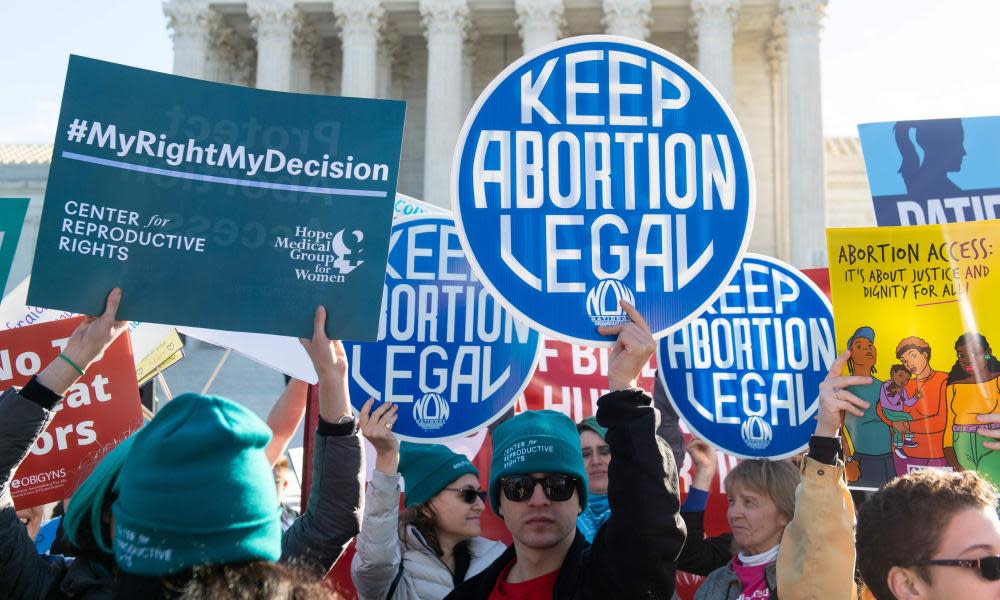Supreme court strikes down restrictive Louisiana abortion law

The US supreme court has upheld a woman’s constitutional right to obtain an abortion in the most-watched abortion case in decades.
In a 5-4 decision, Chief Justice John Roberts sided with liberal judges to rule that Louisiana’s efforts to restrict access to abortion were unconstitutional.
The case, June Medical Services v Russo, was a pivotal test of how the court’s new conservative majority would rule on efforts to restrict women’s right to abortion, after Donald Trump fulfilled his promise to appoint conservative, anti-abortion judges to the bench.
The decision comes after a spring in which eight states sought to heavily restrict abortions as “elective” procedures during the ongoing Covid-19 pandemic.
In his written opinion accompanying the ruling, Roberts referenced a near identical Texas law, which the court ruled unconstitutional in 2016.
“The Louisiana law imposes a burden on access to abortion just as severe as that imposed by the Texas law, for the same reasons. Therefore Louisiana’s law cannot stand under our precedents.”
The ruling comes as a further blow to the president, after the supreme court ruled against the administration over treatment of young, undocumented immigrants on 18 June.
The court in 1973 found women have a constitutional right to obtain an abortion, in the landmark case Roe v Wade. But since then, conservative forces in southern and midwestern states, in particular, have worked to severely restrict access to abortion services in the last three decades.
“Trap” laws, or “targeted regulation of abortion providers,” are measures often passed under the guise of safety, but provide little or no medical benefit for women. However, they are highly effective at shuttering clinics, which perform the majority of America’s abortions.
June Medical Services v Russo looked at a restriction passed by Louisiana in 2014. The law required doctors who provide abortions to have written agreements with local hospitals to transfer patients. These agreements, called “admitting privileges”, are extremely difficult to obtain and a breadth of research has shown they provide no medical benefit.
The law threatened to close all three of Louisiana’s clinics. That would have more than tripled the average distance women in the region would have to travel to access abortion services, and would disproportionately affect low-income women of color, according to research in the journal Contraception.
The year Louisiana’s law was passed, the vast majority of women who obtained abortions had a high school diploma as their highest academic qualification. More than two-thirds were black, and most came from low-income, high-poverty areas of Louisiana, often ranked as the poorest state in the nation, the same study found.
Monday’s ruling is a major victory for abortion rights campaigners, and a potential blow to Trump’s re-election hopes.
The Guttmacher Institute, which advocates for sexual and reproductive health rights, described the verdict as “a critical win in reaffirming the right to abortion access”.
“We’re relieved that people in Louisiana can still get care & celebrate this victory in the ongoing fight to ensure abortion rights for all,” the institute said in a tweet.
Physicians for reproductive health, a national advocacy organization, said: “This is great news and affirms what we know to be true … medically unnecessary restrictions on abortion care are unlawful and dangerous.”
In 2016, the supreme court ruled on an identical law out of Texas, called Whole Woman’s Health v Hellerstedt, ruling it unconstitutional. Louisiana’s law was considered dead in the water.
But the state continued to press its case, and eventually won in the fifth circuit court of appeals, arguably the most conservative appeals court in the nation. In an incredibly rare move, the supreme court agreed to hear Louisiana’s case, despite its own recent Texas decision. Many court-watchers believe what had changed was not the law – but the court itself.
Trump pledged during his 2016 election campaign to overturn Roe v Wade, a key goal of rightwing evangelical Republicans. The president has repeatedly touted his success in nominating two ultra-conservative justices to the supreme court, tilting the balance of the nine-member court to the right.
Those judges, Neil Gorsuch and Brett Kavanaugh, voted against the decision announced on Monday, but Roberts’ siding with the more liberal element of the supreme court bench meant their actions, alongside established conservative justices were not enough to carry the day.

